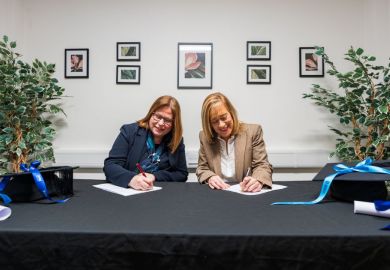Universities should limit the extent to which they allow demand from students, governments and research funders to dictate their education and research focus, according to an institutional leader.
Katherine Fleming, provost of New York University, said her institution was “in a moment where if we did let demand dictate things, we could basically turn into a gigantic teaching institution for data science and computational sciences”. Instead, NYU has had to “have difficult conversations about the fact that even though increasingly that’s what people want, there do have to be limits to the extent to which that’s going to be the only thing that’s on offer”.
Speaking at Times Higher Education’s MENA Universities Summit, which was held online in partnership with NYU Abu Dhabi, Professor Fleming said this pressure had come from research funders, who increasingly favour applied research, as well as students and parents, who are concerned about employment outcomes.
“I don’t think we should necessarily be coercing people into studying things that they don’t particularly want to study, but we do have to keep articulating why fields of study are really important even if in the current moment they aren’t as in vogue as they were 100 years ago,” she said.
Professor Fleming compared the notion of universities following demand and deprioritising arts, humanities and social sciences education and research to “language extinction”.
“When we hear about intangible cultural heritage that is waning or being lost, we should all be really concerned about it, because it’s part of a greater whole, the value of which we benefit from even if we aren’t aware of the ways in which we’re benefiting. That’s very much the way I think of fields of study and academic disciplines,” she said.
However, she acknowledged that, in the case of US higher education, the question of the extent to which institutions “should allow demand to be the sole or even major criterion around which we build our course offerings [and] undertake our hiring” was deeply embedded with the cost of attending university.
“It’s really sad that we’ve created a world that is of such inequality that only certain people now can consider studying certain fields – can consider the pursuit of literature as something they can afford to undertake, for example,” she said.
Professor Fleming also spoke about NYU’s position as a global university, with campuses and study centres across the world, and highlighted that research culture “differs from place to place”. She said people tended to focus on the language and cultural benefits of studying abroad or working overseas, but there were also huge research benefits that were often overlooked.
Professor Fleming, who was previously an academic at the École Normale Supérieure in Paris, cited the example of mathematical education and research in France being “very distinctive”.
“We discovered that it could be really valuable to send students from New York City to France to learn to study mathematics and understand mathematical research in a really different way, even if they perhaps they didn’t have a particular interest in French language or culture,” she said.
Register to continue
Why register?
- Registration is free and only takes a moment
- Once registered, you can read 3 articles a month
- Sign up for our newsletter
Subscribe
Or subscribe for unlimited access to:
- Unlimited access to news, views, insights & reviews
- Digital editions
- Digital access to THE’s university and college rankings analysis
Already registered or a current subscriber?








